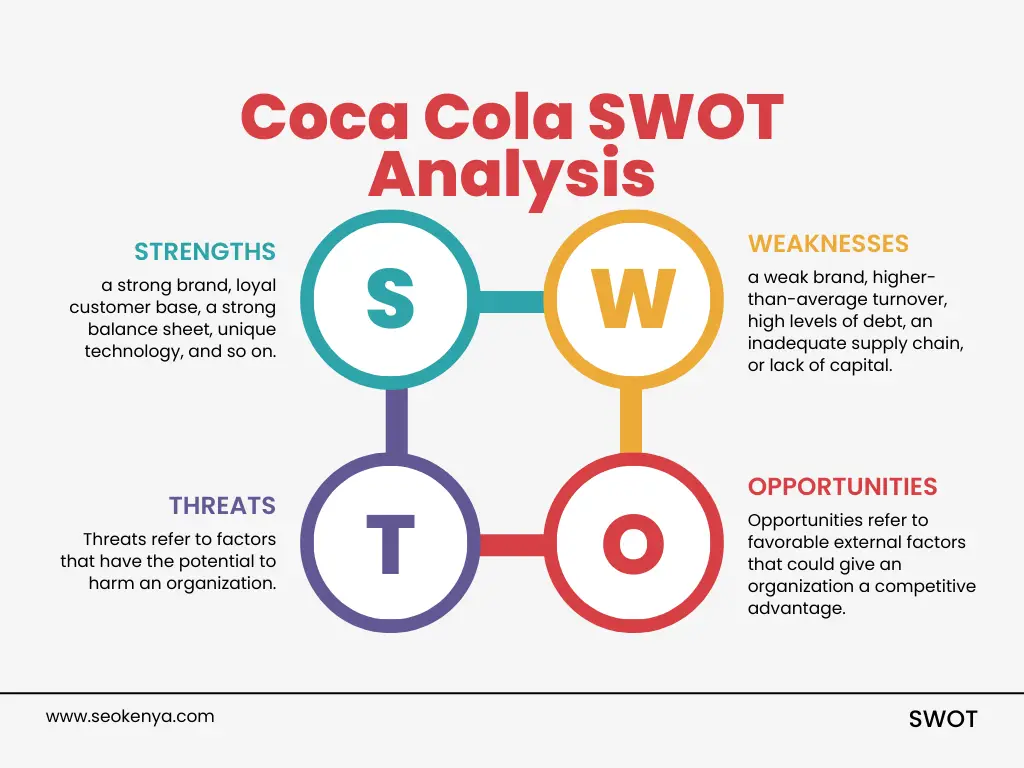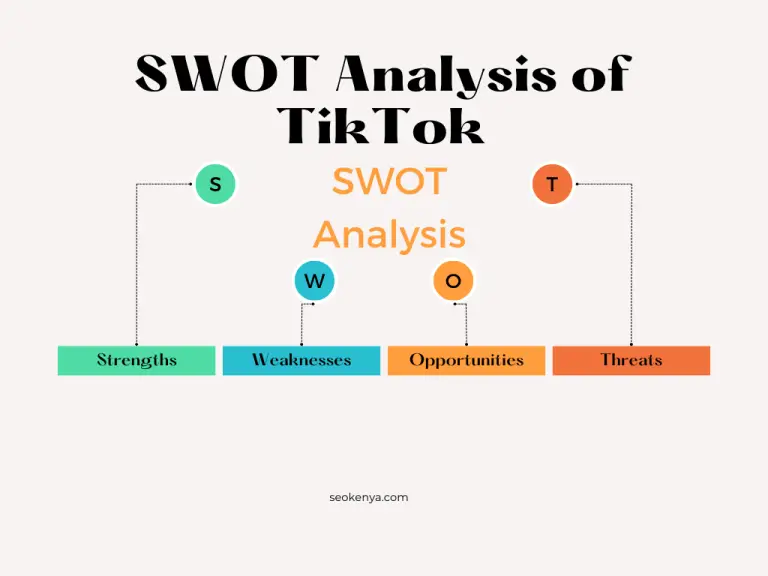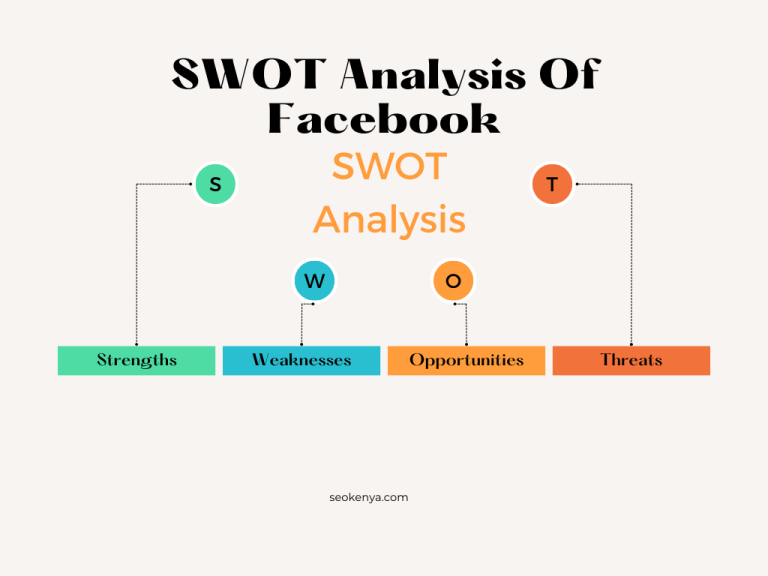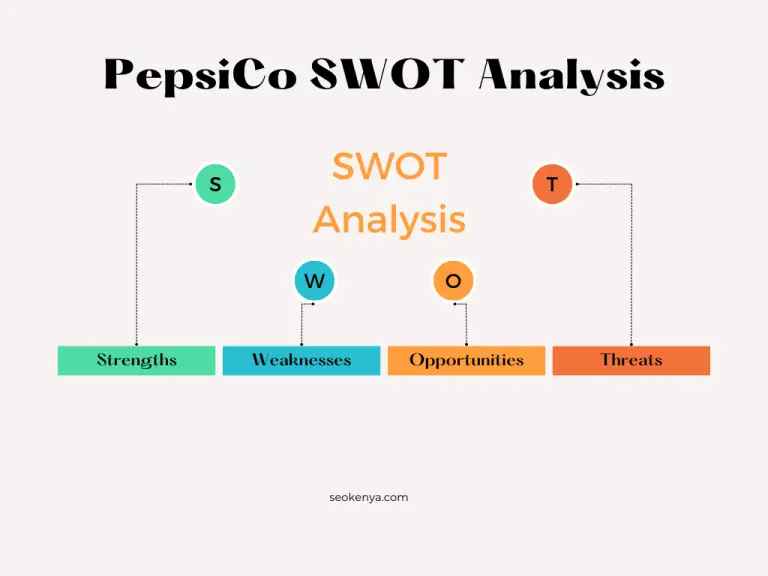In-Depth Coca-Cola SWOT Analysis; Strengths, Weaknesses, Opportunities, and Threats
As one of the world’s most recognizable and established beverage brands, Coca-Cola has a rich history of success and growth.
However, in today’s rapidly changing market, it’s essential for companies to continually re-evaluate their strengths, weaknesses, opportunities, and threats (SWOT analysis) to stay ahead of the competition.
This article provides a comprehensive SWOT analysis of Coca-Cola, offering insight into how the company can overcome its weaknesses and capitalize on its strengths to maintain its position as a top player in the beverage industry.

Strengths of Coca-Cola
Strong Brand Recognition:
Coca-Cola is one of the world’s most recognizable and iconic brands, with a long history of positive brand equity. This gives the company a significant advantage in terms of customer loyalty and brand recognition, making it easier to market and sell its products.
Wide Product Range:
Coca-Cola offers a diverse range of beverages, including carbonated soft drinks, juices, teas, sports drinks, and more. This broad portfolio of products allows the company to appeal to a wide range of customers and meet different taste preferences.
Global Presence:
Coca-Cola has a strong global presence, with operations in over 200 countries and territories. This extensive reach enables the company to tap into new markets and expand its customer base, while also mitigating the impact of local economic downturns.
Strong Distribution Network:
Coca-Cola has a well-established distribution network that enables the company to quickly and efficiently reach customers across the globe. This strong infrastructure is a critical factor in the company’s ability to maintain its market share and respond to changing customer demand.
Diversified product portfolio:
Coca-Cola offers a wide range of beverages, including carbonated soft drinks, juices, water, sports drinks, and teas, giving the company a competitive advantage in the market.
Strong marketing and advertising capabilities:
Coca-Cola is known for its successful marketing and advertising campaigns, which help to increase brand awareness and drive sales.
Weaknesses for Coca-Cola
Dependence on Carbonated Soft Drinks:
Despite its wide product range, Coca-Cola remains heavily dependent on carbonated soft drinks, which have been declining in popularity in recent years. This reliance on a single product category leaves the company vulnerable to shifts in consumer preferences and changing market trends.
Health Concerns:
The high sugar content of many of Coca-Cola’s products has led to growing concerns about the health impact of these drinks. This negative perception has been fueled by increasing public awareness of the obesity epidemic and the negative health effects of sugary drinks.
Intense Competition:
Coca-Cola operates in a highly competitive market, facing intense pressure from rival beverage companies and new entrants. This intense competition makes it challenging for the company to maintain its market share and profitability.
Dependence on sugary drinks:
Despite efforts to expand its product portfolio, Coca-Cola is still heavily dependent on sugary drinks, which face increasing criticism and regulation due to health concerns.
Vulnerability to economic downturns:
Coca-Cola’s sales are vulnerable to economic downturns, as consumers may reduce their spending on non-essential items during economic recessions.
Opportunities for Coca-Cola
Growing Demand for Healthy Beverages:
The growing trend toward healthier living and healthier diets presents a significant opportunity for Coca-Cola to expand its product offerings and tap into this growing market segment.
Emerging Markets:
With many emerging markets experiencing strong economic growth, there is a significant opportunity for Coca-Cola to expand its global presence and tap into these new markets.
Increasing Focus on Sustainability:
The growing global emphasis on sustainability presents an opportunity for Coca-Cola to position itself as a leader in this area, leveraging its brand and resources to promote sustainable practices and products.
Threats to Coca-Cola
Government Regulations:
Coca-Cola is subject to a wide range of government regulations, including restrictions on advertising, labeling, and product ingredients. Changes in these regulations or new legislation could have a significant impact on the company’s profitability and competitiveness.
Health Concerns:
The negative perception of sugary drinks continues to be a significant threat to Coca-Cola’s business, as health-conscious consumers increasingly avoid these products.
Changing Consumer Preferences:
The rapidly changing preferences and tastes of consumers present a significant challenge for Coca-Cola, as the company must continually adapt its products
Coca-Cola is one of the largest and most recognizable beverage companies in the world. The company’s history and global presence, combined with its diversified portfolio of beverages and successful marketing strategies, make it a market leader in the industry.


